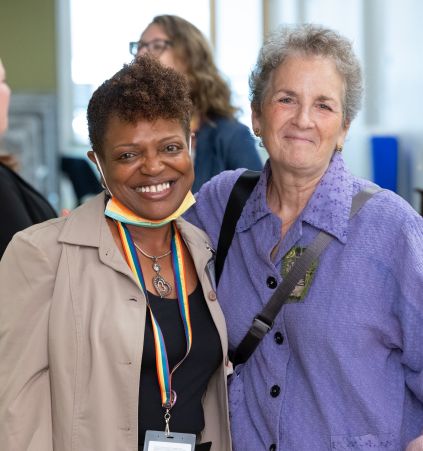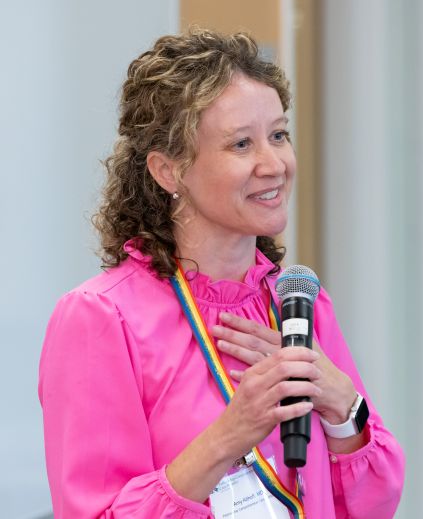Partnership Comprehensive Care Practice Celebrates 30 Years of Service
October 11, 2023

On Friday, September 22, clinicians, researchers, community outreach professionals, patient advocates, public health officials and guests gathered to celebrate the 30th anniversary of the Partnership Comprehensive Care Practice at a symposium, entitled “The Partnership: Then & Now.” The gathering took place at Drexel’s Health Sciences Building in University City. The program featured remarks from current and former Partnership leaders, as well as esteemed experts from local government and nonprofit organizations.
View photos from the event
Charles B. Cairns, MD, the Walter H. and Leonore Annenberg Dean of the College of Medicine and senior vice president of medical affairs at Drexel, noted in his welcome that the Partnership’s efforts “are consistent with Drexel’s mission of caring for people who’ve been underserved by the health care system and underrepresented in the innovation that can make a difference in communities.” He pointed out that the Partnership has thrived despite many challenges.
In her opening remarks, Marla Gold, MD, founder of the Partnership and former senior vice provost for community health and chief wellness officer, Drexel University, looked back on the early days of the clinic and the state of HIV care 30 years ago, recalling that “care was fragmented” at the start of the epidemic and that “Philadelphia was a city of firsts,” citing local organizations like Action AIDS, Philadelphia Community Health Alternatives (now known as the Mazzoni Center), MANNA, the AIDS Law Project, the AIDS Library, and many others that were on the front line of the early care of patients with HIV.
Gold described the collaboration of three hospitals to apply for grant funding from the Ryan White Care Act and the Philadelphia Department of Health to create a collaborative partnership to care for patients across several sites. That organization, known as Partnership for the People, eventually consolidated to one site, resulting in the Partnership Comprehensive Care Practice. “In a country where systems of care are often designed to keep people out, the Partnership was designed to be accessible, affordable and available to all who need high-quality care,” Gold said, adding that sometimes quality care means “finding [patients] shelter, a home; sometimes it means ensuring access to nutritious food. It means understanding that all providers play a key role and health is but one piece.” She expressed hope for the future, despite many ongoing challenges in health care and the political realm: “I know that a committed group of people with an innovative idea can battle through bureaucracy and create something beautiful.”

Amy Althoff, MD, medical director at the Partnership and associate professor of medicine at the College of Medicine, highlighted the Partnership’s more recent history, including the effect of COVID-19 and the closure of Hahnemann University Hospital on the clinic. “This dramatically affected our work. It affected our marginalized populations. The bar was raised in terms of what we needed to do,” said Althoff, adding that this was a cause for reflection and growth, resulting in the hiring of new practitioners and staff, among other changes, to find the most efficient ways of proving care. Today, the clinic is a place where patients can access medical, behavioral health, social, nutrition and pharmacy services, all in ways that honor all patients’ lived experiences and identities. The clinic has increased case management services, doubled patient care time at St. Christopher’s Hospital for Children and restarted urgent patient visits, which had been halted during COVID and due to staff shortages. Althoff concluded on the hopeful note that the clinic has now reached an HIV viral load suppression of 89%. “After doing all of these things,” she said, “I believe we can end the HIV epidemic.”
In her presentation, “Ending the HIV Epidemic,” Anna Thomas-Ferraioli, MPH, Ending the HIV Epidemic (EHE) advisor at the Philadelphia Department of Public Health, discussed Philadelphia’s EHE goals, which include reducing the number of new HIV infections by 75% by the year 2025, using the pillars of “Diagnose, Treat, Prevent and Respond.” Thomas-Ferraioli outlined the City of Philadelphia’s numerous intervention efforts in all of these areas. She also described new endeavors to create transitional housing to support people with HIV who are unstably housed, homeless or burdened by high rent costs, as well as access to housing case managers with the goal of moving people toward permanent affordable housing. The city is also starting focus groups with older adults with HIV and planning to introduce services based on the needs identified in those groups. Thomas-Ferraioli urged all providers to simplify access to care for patients with HIV, to improve retention and quality of care. “I know it’s a huge undertaking, but it’s one we can all rise to, to try to streamline access for our clients, for our patients, so they will access HIV prevention and care,” she said.
Gregg Alleyne, MD, a clinician at the Partnership for 25 years, was honored for his dedication to caring for HIV-positive patients. Numerous current and former colleagues spoke about his years of excellence as a clinician. Alleyne addressed the gathering with gratitude. “My team has been my rock over the last few years,” he said, adding that his greatest inspiration was his patients: “My patients have been with me, taught me and raised me. And that’s really important. We must never forget that that’s the whole point of what we’re doing.” Alleyne also offered a charge to those who will continue the work of the Partnership, saying, “In those times when you feel that this tough work, that it’s challenging and that you don't want to go any further – just think about what impact we're having.”
The symposium closed with a panel discussion. Panelists included:
- Sara K. Schultz, MD ’10, associate professor of medicine and director, Infectious Diseases Fellowship program, Temple University, Lewis Katz School of Medicine
- Sebrina Tate, MSW, executive director, Bebashi – Transition to Hope
- Vanessa Ferrel, MD, MPH, assistant professor of medicine, Drexel University College of Medicine, and physician, Partnership Comprehensive Care Practice
- Janell Johnson Washington, HIV community activist and a member of the Community Advisory Board at the Partnership Comprehensive Care Practice
- Anna Thomas-Ferraioli, MPH, Ending the HIV Epidemic advisor, Philadelphia Department of Public Health, Division of HIV Health
They reflected on their journeys to becoming involved in the HIV care community, and addressed the relationship between historical activism efforts and ongoing ones, mitigating barriers to care for marginalized people, ways to improve public education around HIV care, and what gives them hope as they look to the future. On the subject of barriers to care, Janell Johnson Washington said, “We as a Community Advocacy Board want to bring to the forefront that, for as many voices as you hear, there are voices you do not hear.” Sebrina Tate described the importance of going out into communities to deliver care, including preventive services like the mpox vaccine: “We won’t sit in our offices and wait for people to come to us,” she said.
Discussing the commonalities between HIV infection and substance use disorders, Sara Schultz said, “There are so many similarities between the struggle for HIV advocacy and HIV justice that we're seeing reflected in people who inject drugs. We know that treating substance use disorder improves HIV outcomes, and we know that HIV testing in people who inject drugs is such a crucial way to end the epidemic.”
Anna Thomas-Ferraioli addressed the importance of comprehensive education in the prevention of HIV transmission, noting, “There’s knowledge, and then there’s being empowered to use the knowledge you have. When we're in a position where people don't feel empowered to take care of their own health, to advocate for themselves, we are in a place of real danger and risk when it comes to young people.”
In closing remarks about what gives the panelists hope, Vanessa Ferrel thanked their patients “for sharing their stories and their successes with me. It’s always very humbling to be part of that.” They went on to thank the staff at the Partnership – “everyone whose job is harder than mine” – and urged everyone to support members of community organizations who share their intellectual and emotional labor for the benefit of all.
Back to Top